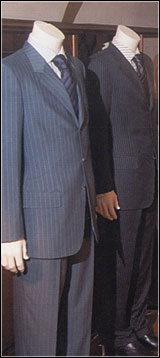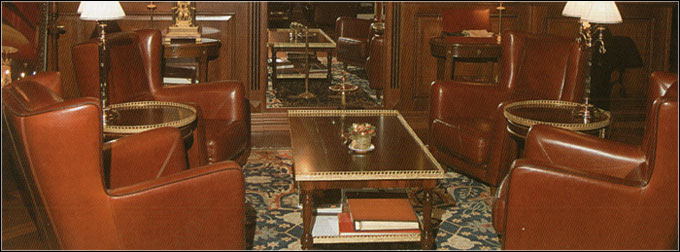
The ROYAL treatment ...
Tailoring to Moscow's Elite
Plush rooms, adorned with genuine artwork from the early 1900s, heavy chandeliers and classic redwood furniture are the face of Imperial Tailoring Co., one of Moscow's most exclusive salons for made-to-order men's clothing. Sammy Kotwani, an Indian who came to Moscow over fourteen years ago, heads the company, which dresses Moscow Mayor Yury Luzhkov, Ukraine's outgoing President Leonid Kuchma and other members of the former Soviet Union's political and business elite.
"It's all about the three 'Cs' over here," says Kotwani, lighting up another cigarette. There are plenty of Cs - coffee, cognac and cigars - to go around this tailor's showroom, located just minutes away from the Kremlin at Gostinny Dvor shopping center.
The art of tailoring is dying, as brand consciousness. convenience and frugality encourage more and more people lo buy off the rack. Nevertheless. Kotwani is determined to keep the tradition of a persona] tailor alive, at least in Moscow at his Imperial Tailoring Co.
"Men don't like to shop." Kotwani says. so showering clients with luxury is just his means for surviving in the market. "They come in here to relax, have a cigar, cognac," he explains. They putt away while choosing from 7.000 different fabrics available and and sip while getting a proper fitting.
The twenty-five person staff, which includes two designers and ten master tailors, is on hand to advise customers on the right type of suit, ranging from $1,100 to more than $7.000 in price. Kotwani considers a person's skin tone, hair color, occupation and personal style, when choosing the most fitting wardrobe for the client. In general, stripes and squares are not for people with imperfect bodies, he says, so heavy people should stay away from large patterns.
Getting Started ...

How did a foreigner start a business that now dresses Russia's biggest fat cats?
Tailoring is a family craft for Kotwani, whose grandfather's brother founded the business in 1969. After receiving his own textile engineering degree in India and studying tailoring in Hong Kong, Kotwani opened a high-end tailor shop in Ethiopia in 1988, also making clothes for clients in Nairobi, Angola, Zambia. Cameroon and Zaire, now the Republic of Congo.
"Africans always like to dress well," Kotwani says, but something just "didn't click." So. Kotwani traded the politically turbulent region for Europe, setting up businesses in Belgium and France.
Without knowing French, establishing a rapport with European customers also proved difficult for Kotwani. who felt "a lot of mistrust." Knowing that he'd always be an outsider in the Old World, he sought advice from a fellow businessman and partner with Ernst & Young, who suggested going to Russia, where the market for luxury goods was healing up.
Kotwani moved to Moscow in 1990, when 'left', 'right' and 'how much' were the only words he could say in Russian. Despite the language barrier, "1 felt from day one that this was my country," he recalls.
Surviving the 90s ...
Kotwani's new country didn't always treat him well.
"My first shipment from Hong Kong never arrived." Kotwani says. He made the mistake of using the state-run postal service to ship materials and paid handsomely for it. "It was a very tough time," he says. "But, you don't come to any place knowing everything in advance."
Capitalizing on old contacts, Kotwani began dressing African diplomats in Moscow, eventually adding embassy workers from other parts of the world and foreign businessmen to his client rolodcx. He found that getting new clients, however, was just half the game in the lawless dawn of Russia's capitalism.
In 1992, Kotwani bought his first car in Moscow, a Zhiguli, which was stolen the next day. He learned to carry cash in an outside pocket after narrowly escaping a bullet to the head, while being robbed just outside of his apartment. However, the real problems began when the tailoring business started to boom.
"A good tailor doesn't advertise," Kotwani says. "His product does it for him." As word spread about Kotwani's trade and his business reached beyond Moscow, his competitors got worried. Kotwani was beaten to unconsciousness in a five-star hotel in Helsinki, where he came to collect orders as a traveling tailor. Being outside of Russia, he let his guard down and opened the hotel door without checking who was calling first. Kolwani is sure that the afternoon visit, which left him on crutches for the next eight months, was from Russian competitors, whom he declines to name. Why is he so certain? "The only thing that vanished from the hotel was the client list," Kotwani says.
The brutal incident made Kotwani proud, since such personal attention meant that his business was on the right track. Nevertheless, he decided to spend some time away from Moscow for a short time, targeting foreign consulate workers and United Nations representatives in St. Petersburg and Kiev.
Changing with the Times ...

The 1998 crisis dealt Kotwani a harder blow than did his competitors. The devalued ruble sank many foreign businesses, including the tailoring company, which was then focused on foreign clients, was also were badly hurt. While Kotwani managed to stay afloat, over 60 percent of his customer base disappeared virtually overnight. "We decided to target Russian clients from then on," says Kotwani. who by that point was working with three brothers and five cousins who joined his Moscow office. The family did not have a formal showroom yet. working as traveling tailors, giving fittings at customers' homes. Therefore, a complete restructuring was the logical next step.
The company had a lottery and Sammy's brother. Jimmy Kotwani, drew the lucky card. He enrolled in Russian language courses to become the company's new client manager for Russian speakers. Sammy Kotwani, who picked up spoken Russian along the way as welt, saw benefits of working with locals right away.
"We look at a client like the goose who laved a golden egg," he says, explaining that satisfied customers recommend the tailors to their fathers, uncles or friends. The company was growing once again, but in contrast to foreigners, who would rotate in and out of the country every few years, Russian clients were here to stay.
The business environment was not the only thing in flux. "Things were changing in 2000, so I understood we could no longer work with the Hong Kong style of tailoring," Kotwani recalls. To keep up with the current fashion trends and tricks, he enrolled in a tailoring academy in London, but continued running the business in Russia since part of the two-year course could be done through correspondence.
One of the most important lessons Kotwani learned in London was that to survive in the marketplace for the long haul, a tailor needs a shop with the right kind of atmosphere.
Growing the Business ...

Opening a first-class showroom, modeled on London's famed Regency Tailor Shop, was Kotwani's next goal.
He aimed to run a long-term business, so the company sacrificed profits for steady clientele. As an Indian and a professional tailor. Kotwani says. he understood that an $800 Hugo Boss suit only costs $75 to make - "the rest is all marketing." Reasonable prices and quality service helped him win over more Russian clients, but low profit margins kept Moscow's top-notch real estate out of reach.
It took the help of Kotwani's well-connected clients in order for Imperial Tailoring to get a royal palace. Vladimir Resin. Moscow's Deputy Mayor and the city's chief of construction, asked Kotwani about his shop's location. The tailors came to the Deputy Mayor's office to take his measurements, but as the company's selection of fabrics grew, it became more and more cumbersome for the business to travel. Kotwani confessed that opening a shop was not an option, considering the ever-rising costs of quality office space- So, Resin pulled some strings to help Imperial Tailoring get a ten-year lease on 250 square meters of office space near the Kremlin. "We got reasonable rent," says Kotwani. who immediately hired a British-educated designer to renovate the arched walls of the new Gostinny Dvor showroom into an Old Wbrld tailor's paradise.
With a lot of pomp, Iosif Kobzon, a fixture of Russia's arts scene and one of Kotwani's clients, opened the Imperial Tailoring Co.'s showroom in early 2003. The event also gave the company, previously called Wintex, a chance to change its name and logo. "There arc lots of problems with protecting your name." says Kolwani, who found third parties regularly misrepresenting their suits as Wintex merchandise. Also. a myriad of window replacement and cleaning products flooded the market. Wintex became disassociated from Winning Textiles in the minds of customers, who came to regard the name as a household products brand. The new name. Imperial Tailoring, is meant to reflect how business is managed at the company today. Each customer can get three fittings in a room with six mirrors, which provide a 360-degree view of the body Heeding to his clients' sophisticated tastes, Kotwani now only imports fabrics from Italy and Great Britain. The company went from making 20 suits a month in the nineties to currently making 250 suits a month. Kotwani takes this as a sign that his tailor shop, made to resemble a kind of'good old boys club', touched the right cord with Russia's moneyed elite.
Secrets of Success ...

Kotwani credits working hard and remembering that customers drive the service industry for his success.
"We don't treat the customer as a king, we treat the customer as a God," Kotwani says. To underscore that point. Imperial Tailoring Co. offers various free perks to customers. For example, every six months after making a suit, the company takes it back to clean, press and repair any wear and tear that may have occurred. Once.
Kotwani even offered to repair a zipper on a jacket, which one of Imperial Tailoring Co.'s regulars bought at another shop. It wasn't the company's obligation to do it, Kotwani says. but he wanted to show the client that Imperial Tailoring is ready to take any burden off his shoulders.
Of course, getting fire department and health department permits, as well as other red tape involved in doing business in the former Soviet Union still gets to Kotwani. Having powerful clients, though, helps along the way. Imperial Tailoring Co. opened a show room in Kazakhstan's capital. Astana, in November. Having the country's President. Nursultan Nazarbacv, on the client list surely didn't hurt Imperial Tailoring Co.'s Kazakh business. which is already booming at the company's Almaty shop.
Kotwani wants to expand into other regions as well. He is already in negotiations about opening a shop in Nizhniy Novgorod and is considering franchising the business to achieve faster growth.
"We arc looking to Bombay next/' Kotwani says. his eyes lighting up. India, like Russia, lias seen extraordinary economic growth in the past several years. Kotwani doesn't want to miss the action back home. He hopes to bring Imperial Tailoring Co. to his hometown of Bombay, today's Mumbai, in the near future.


